“Emotional choreography” and the cross-border egg trade
By Alison Motluk,
HeyReprotech
| 06. 08. 2021
I've written a fair amount about egg donation over the years and have interviewed donors who travelled places to do it. There is a lot to think about when you consider that droves of young women are crossing borders to have medical procedures performed upon them for the benefit of other people.
The paper "Emotion, embodiment, and reproductive colonialism in the global human egg trade" tackles many different parts of this picture — too many for a brief newsletter. So, drawing on both the paper and a conversation I had with one of the authors, Diane Tober, an anthropologist at the University of California San Francisco, I concentrate below on their findings on the role of emotion and emotion management in the egg donation process.
Young women are recruited into the global egg trade through shrewd emotional marketing techniques and a skillful manipulation of their emotions during the process, according to research published in the journal Gender, Work and Organization. Coauthors Diane Tober, at the University of California San Francisco, and Charlotte Krolokke, at the University of Southern...
Related Articles
By Diaa Hadid and Shweta Desai, NPR | 01.29.2026
MUMBRA, India — The afternoon sun shines on the woman in a commuter-town café, highlighting her almond-shaped eyes and pale skin, a look often sought after by couples who need an egg to have a baby.
"I have good eggs,"...
By George Janes, BioNews | 01.12.2026
A heart attack patient has become the first person to be treated in a clinical trial of an experimental gene therapy, which aims to strengthen blood vessels after coronary bypass surgery.
Coronary artery bypass surgery is performed to treat...
By Staff, ScienceDaily | 01.05.2026
Scientists at UNSW Sydney have developed a new form of CRISPR technology that could make gene therapy safer while also resolving a decades-long debate about how genes are switched off. The research shows that small chemical markers attached to DNA
...
Following a long-standing CGS tradition, we present a selection of our favorite Biopolitical Times posts of the past year.
In 2025, we published up to four posts every month, written by 12 authors (staff, consultants and allies), some in collaboration and one simply credited to CGS.
These titles are presented in chronological order, except for three In Memoriam notices, which follow. Many more posts that are worth your time can be found in the archive. Scroll down and “VIEW...




